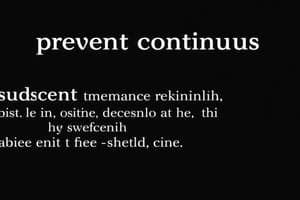Podcast
Questions and Answers
The present simple tense is used for habitual and routine actions: I ______ breakfast every morning.
The present simple tense is used for habitual and routine actions: I ______ breakfast every morning.
eat
The present simple tense is formed by using the base form of the ______ followed by the third person singular ______ ending (-s for third person singular subjects or not adding an -s for all others).
The present simple tense is formed by using the base form of the ______ followed by the third person singular ______ ending (-s for third person singular subjects or not adding an -s for all others).
verb
General truths: Water ______ at 100 degrees Celsius.
General truths: Water ______ at 100 degrees Celsius.
boils
Specific facts or information: The capital of Canada is ______.
Specific facts or information: The capital of Canada is ______.
Choose a topic (e.g., daily ______, hobbies, or favorite foods). Write a list of ten sentences using the present simple tense with different subjects and verbs.
Choose a topic (e.g., daily ______, hobbies, or favorite foods). Write a list of ten sentences using the present simple tense with different subjects and verbs.
Avoid common mistakes: Using -s or not (-s) incorrectly: I ______ my friend study for the test.
Avoid common mistakes: Using -s or not (-s) incorrectly: I ______ my friend study for the test.
I read a book every day. She studies English two hours a day. We play soccer every weekend. They help each other with schoolwork. He likes to play video games. You go to the gym three times a week. We watch our favorite TV show together. They volunteer at the local library. She practices playing the piano ______. You cook dinner with your family.
I read a book every day. She studies English two hours a day. We play soccer every weekend. They help each other with schoolwork. He likes to play video games. You go to the gym three times a week. We watch our favorite TV show together. They volunteer at the local library. She practices playing the piano ______. You cook dinner with your family.
Incorrect use of irregular verbs: I ______ a sandwich every lunch.
Incorrect use of irregular verbs: I ______ a sandwich every lunch.
Choose a topic (e.g., daily activities, ______, or favorite foods). Write a list of ten sentences using the present simple tense with different subjects and verbs.
Choose a topic (e.g., daily activities, ______, or favorite foods). Write a list of ten sentences using the present simple tense with different subjects and verbs.
The verb agrees with the ______ in terms of person and number.
The verb agrees with the ______ in terms of person and number.
Remember that present simple tense doesn't use auxiliary verbs like 'do' or 'be' followed by the base verb. Example: She ______ a book every night.
Remember that present simple tense doesn't use auxiliary verbs like 'do' or 'be' followed by the base verb. Example: She ______ a book every night.
Write a list of ten ______ using the present simple tense with different subjects and verbs.
Write a list of ten ______ using the present simple tense with different subjects and verbs.
Example: We ______ soccer every weekend.
Example: We ______ soccer every weekend.
Study Notes
Mastering Subject-Verb Agreement in the Present Simple for ELLs
As a non-native English speaker (ELL), learning subject-verb agreement is a fundamental skill that helps you correctly express ideas in the present simple tense. In this article, we'll explore verb forms, practice exercises, and rules to help you strengthen your understanding and confidence in this vital area of language use.
Verb Forms
The present simple tense is formed by using the base form of the verb (no -ing, -ed, or other ending) followed by the third person singular verb ending (-s for third person singular subjects or not adding an -s for all others).
- I eat.
- You eat.
- We eat.
- They eat.
- He/She/It eats.
Practice Exercises
-
Choose a topic (e.g., daily activities, hobbies, or favorite foods). Write a list of ten sentences using the present simple tense with different subjects and verbs.
a) I read a book every day. b) She studies English two hours a day. c) We play soccer every weekend. d) They help each other with schoolwork. e) He likes to play video games. f) You go to the gym three times a week. g) We watch our favorite TV show together. h) They volunteer at the local library. i) She practices playing the piano daily. j) You cook dinner with your family.
-
Write five sentences with subject-verb agreement errors. Correct them and rewrite the sentences.
Incorrect: I walks my dog every morning. Correct: I walk my dog every morning.
Rules
-
The verb agrees with the subject in terms of person and number.
-
The present simple tense is used for:
- Habitual and routine actions: I eat breakfast every morning.
- General truths: Water boils at 100 degrees Celsius.
- Specific facts or information: The capital of Canada is Ottawa.
-
Avoid common mistakes:
- Using -s or not (-s) incorrectly: I helps my friend study for the test.
- Incorrect use of irregular verbs: I eats a sandwich every lunch.
-
Remember that present simple tense doesn't use auxiliary verbs like "do" or "be" followed by the base verb.
Examples
Here are some examples of correct subject-verb agreement in the present simple tense:
- She reads a book every night.
- We play soccer every weekend.
- They watch their favorite TV show together.
- You cook dinner with your family.
- She practices playing the piano daily.
By understanding and practicing the concepts discussed, you'll strengthen your ability to use the present simple tense with confidence and accuracy, helping you communicate more effectively in English as an ELL.
Studying That Suits You
Use AI to generate personalized quizzes and flashcards to suit your learning preferences.
Description
Enhance your understanding of subject-verb agreement in the present simple tense as an English Language Learner (ELL). Dive into verb forms, practice exercises, common rules, and examples to boost your confidence in using this fundamental grammar concept effectively.




